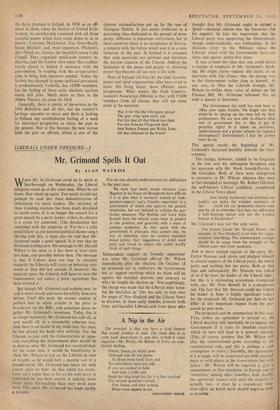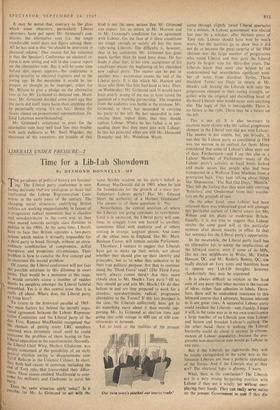LIBERALS UNDER PRESSURE—!
Mr. Grimond Spells It Out
By ALAN WATKINS
WHEN Mr. Jo Grimond stood up to speak at Scarborough on Wednesday, the Liberal delegates stood up at the same time. When he sat down, they stood up again. Too much should not perhaps be read into these demonstrations of enthusiasm for party leaders. The currency of these standing ovations has been much devalued in recent years. It is no longer the reward for a great speech by a party leader; rather, its absence is a cause for comment. (The devaluation has coincided with the adoption of 'For he's a jolly good fellow' as our national political theme-song.) Having said this, it must also be said that Mr. Grimond made a good speech. It is true that he disclosed nothing new. His message to Mr. Harold Wilson is the same as it has been at least since last June, and possibly before then. The message is that if Labour does not lose its absolute majority the Liberals will carry on behaving very much as they did last session; if, however, the majority goes, the Liberals will have to turn the Government out unless a prior agreement has been arrived at.
But though Mr. Grimond said nothing new, he said it more clearly and more forcefully than ever before. Until this week the earnest student of politics had to relate articles in the press to broadcasts on the BBC, and somehow piece to- gether Mr. Grimond's intentions. Today this is no longer necessary. Mr. Grimond has told all, or very nearly all, in a reasonably coherent way.
And there is no doubt in .my mind that, for once, he has played his hand very skilfully. For the Liberals to join with the Conservatives in oppo- sing everything the Government does would be to destroy what Mr. Grimond has accomplished. At the same time it would be humiliating to allow Mr. Wilson to call on the Liberals in time of trouble as he would hail a passing taxi in a thunderstorm. Mr. Grimond has taken the only course open to him : he has asked for terms. Later on I argue that as far as his own party is concerned he has been unwise in making those terms more far-reaching than they need have been. This apart, Mr. Grimond has made hardly a mistake. • For no one should underestimate his difficulties in the past year.
We have had many recent instances [says Bagehot in his Essay on Brougham] how difficult it is to give what is variously termed an 'inde- pendent support.' and a 'friendly opposition.' to a government of which you approve the general tendencies, but are inclined to criticise the par- ticular measures. The Peelites and Lord John Russell have for several years been in general in this position, and generally with a want of popular sympathy. As they agree with the government in principle, they cannot take, by way of objection, what the country considers broad points; their suggestions of detail seem potty and trivial to others—the public hardly think of such things.
'Independent support' or 'friendly opposition' was what Mr. Grimond offered Mr. Wilson immediately after the election. On October 18 he promised not to embarrass the Government but to 'oppose anything which we think will be against the national interests and contrary to what we fought the election on.' Not surprisingly, the charge was made that the Liberals were 'keep- ing the Socialists in.' One has only to turn o'er the pages of New Outlook and the Liberal News to discover, in these early months, protests both from anti-Socialist Liberals and from those who
thought that Mr. Grimond ought to extract a 'price'—electoral reform was the favourite—for his support. In fact the impression that the Liberal party was supporting the Government, though understandable, was misleading: in the divisions prior to the Whitsun recess the Liberals voted with the Government forty-one times and against ninety-five times.
It was around this time that one could' detect a change of emphasis in Mr. Grimond's think- ing. He might claim—indeed, did claim, in an interview with The Times—that the change was in the Government rather than in himself. At any rate, in May the Liberals brought Mr. Wilson to .within three votes of defeat on the Finance Bill. Mr. Grimond followed this up with a speech at Inverness.
The Government [he said] has now been in office over eight months. No longer can they claim to be tidying up the mess left by their predecessors. We are now able tO discern what sort of government this is. Has it got its priorities right? Is it intent on incentives, modernisation and a proper scheme for regional development? Unfortunately I fear the answer must be no.
This speech marks the beginning of Mr. Grimond's increased hostility towards the Gov- ernment.
The change, however, tended to be forgotten in the row over his subsequent broadcast and his interview with Mr. Mark Arnold-Forster in the Guardian. Both of these were interpreted. as overtures to Mr. Wilson. whereas they were in fact intended as warnings. Mr. Robert Glenton, the well-known Liberal candidate, complained in the Liberal News about . . . how utterly incoherent and confused our
leaders can make the simplest statement of fact . could not our spokesmen resolve once and for all to remember that they are addressing a half-listening nation and not the London School of Economics?
Mr. Glenton's was not the only voice.
The present [wrote Mr. Donald Newby, for example, in New Outlook] is no time for vague, academic kite-flying. The commonsense strategy should be to argue from the strength of the Liberal case—not from weakness.
And in more exalted regions of the party Mr. Emlyn Hooson took alarm and pledged himself to eternal support of the Liberal party, the whole party and nothing but the party. Both at that time and subsequently Mr. Hooson was talked of as if he were the leader of the Liberal right : but this is a misleading assessment. Compared with, say, Mr. Peter Bessell, he is a dangerous red. The fact that Mr. Hooson could not follow his leader in June is highly significant today; for the proposals Mr. Grimond put then do not differ in any important respect from the pro- posals he puts now.
The proposals can be summarised in this ‘\ ay. First, unless an agreement is arrived at, the Liberal decision will inevitably be to oppose the Government if it loses its absolute majority, which in turn will lead to a general election. (This, of course, assumes that Mr. Wilson will play the constitutional game according to the constitutional rule, and this is perhaps a rash assumption to make.) econdly, the agreement. if it is made, will be concerned not with electoral ',Acts or with places in the Government but willt policy : Mr. Wilson will be required to give a commitment to free enterprise, to Europe and to 'incentives,' among other novelties. And, thirdly, the agreemat cannot wait until the majority is actually lost: it must be a considered, long- term affair on which work should begin,as soon as possible.
It may be noted that, contrary to the gloss which some observers, particularly Liberal observers, have put upon Mr. Grimond's con- ditions, the alternative vote (i.e. the single transferable vote) does not figure among them. All he has said is that 'we should be interested in electoral reform.' One reason for his reticence is that the Speaker's Conference on electoral re- form is now sitting and will in due course report on the alternative vote. But it will be some time before this report appears—the conference is giving priority to electoral registers and to the voting age. In the meantime it would be im- proper, or thought to be improper, either for Mr. Wilson to give a pledge on the alternative vote or for Mr. Grimond to demand one. More- over, Mr. Grimond decided some years ago that the party did itself more harm than anything else by perpetually crying 'it's not fair.' Hence the recent silence on proportional representation, Dr. Enid Lakeman notwithstanding.
Mr. Grimond's reluctance to press for the alternative vote may well lead him into trouble with such stalwarts as Mr. Basil Wigoder, the chairman of the executive; yet trouble of this kind is not the most serious that Mr. Grimond can expect. Let us return to Mr. Hooson and to Mr. Grimond's conditions for an agreement with Labour. On the face of it these conditions are tough enough to satisfy all but the most right-wing Liberals. The difficulty is, however, that in his comments Mr. Grimond has gone much further than he need have done. He has made it clear that, in his view, acceptance of his conditions means the beginning of his cherished new radical party. The matter can be put in another way: acceptance means the end of the Liberal party. It is this which Mr. Hooson and those who think like him find hard to take. Then, on Wednesday, Mr. Grimond said 'it would have been utterly wrong of me not to have raised the question of a working partnership.' The response from the audience was feeble in the extreme. Mr. Grimond, in short, has succeeded in carrying his party to the left. He has succeeded in con- vincing them, repeat them, that they should replace Labour. Where he has failed is in per- suading them that they must join with Labour. In this his principal allies are still Mr. Desmond Donnelly and Mr. Woodrow Wyatt.



































 Previous page
Previous page